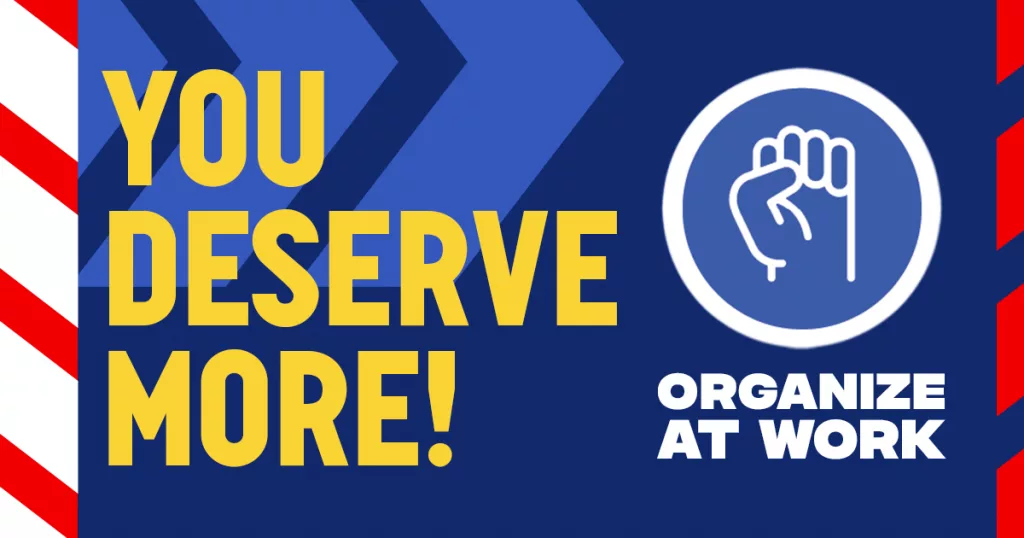Upcoming Events 🗓
There’s no better way to kick off the spring than learning to organize your workplace or help others organize theirs.
Salting 101: Tomorrow!
Looking for a way to join the labor movement? Want to organize your own workplace but … you need a workplace?
You might consider becoming a “salt:” someone who joins a workplace with the intention of organizing a union at it. This is a century-old organizing tradition, but it’s not an easy thing to do, and you can’t do it alone!
Come learn more about what salting is, and how it’s done, at our upcoming training, Salting 101. Join us for this introduction to salting on Feb. 23, at 8:30 p.m. ET (5:30 p.m. PT). Register here.
Foundational Training Series
Join the Emergency Workplace Organizing Committee’s foundational training series, starting on Wednesday, March 8, and running weekly on Wednesdays until March 29. If you want to organize your workplace but don’t know where to start, this training is for you.
Learn how to approach your co-workers, build a team of organizers among them, and develop a campaign. You will meet other workers who are organizing and learn tools, skills, and principles to help you and your co-workers achieve a voice in a more democratic workplace and win the changes you want to see.
In four 90-minute sessions, we will discuss how workers can unite to address issues at the workplace and how to begin the process of unionization. Participants will practice connecting with co-workers and engaging in collective decision-making around common concerns. You will learn how to prepare yourself and your co-workers to take collective action. You’ll learn how to build a democratic organization with your co-workers, from scratch, that can negotiate with the boss over your working conditions.
Space is limited to 200 participants, so sign up now! Register here today.
Once you’ve attended and graduated foundational training, you can also join the EWOC training team by signing up for “train the trainers” on Saturday, April 22. More details to come!

The metaphors we use to describe capitalism have a way of arriving from the imaginary into the real, just like the warnings of workers. In the runaway train that has unleashed catastrophe on East Palestine, Ohio, and many miles of the surrounding area, we have the realization of both.
In December, federal legislators united across party lines to force a contract on hundreds of thousands of rail workers. In circumventing a strike — and the sudden cessation of the perpetual wheels of profit-making — the resolution deprived rail workers of the right to organize and bargain freely.
It also denied them full staffing, safe scheduling, and adequate sick leave — key demands that workers cautioned and spoke to a broader set of operational flaws which threatened not just their lives, but all of ours. The railroad industry, they told us, had adopted a relentlessly cost-cutting approach that undermined the safety and effectiveness of rail transport itself.
It makes sense that ruthlessly profit-seeking railroad companies, which will pay millions to lobbyists to avoid fairly compensating a fully staffed workforce, are unwilling to prioritize basic maintenance and safety measures. The record bears witness: between 2011 and 2021, the rail industry collectively spent $191 billion on stock buybacks but only $138 billion on capital investments.
A runaway train is a hard thing to stop, but rail workers are continuing to organize around both their own needs and the common good. “The fight for what we need as railroad workers, and what will benefit the safety and supply chain for the country, doesn’t stop,” said Ross Grooters, a BLET engineer and Railroad Workers United co-chair. “I don’t think the industry is sustainable.”
We’ll keep doing the same: fighting for ourselves and for us all.
EWOC is by workers, for workers. Any workers, anywhere, can get help from EWOC to build power, fight back, and make a better version of their workplace and the world.
EWOC is run by hundreds of volunteers, people all over coming together to dedicate their odd hours to the project of working-class power. We’re not going anywhere. We’ll keep fighting.
World of Work 🌍
California: Star Garden dancers in Los Angeles are seeking to join Actors’ Equity and become the first strip club to unionize since the now-closed Lusty Lady in San Francisco in 1997. Multiple proceedings are currently awaiting decision from the National Labor Relations Board (NLRB), relating to retaliatory firings and contested ballots from a union election held late last year.
New York: Workers at a Tesla plant in Buffalo announced a union drive last week affiliated with Workers United. The company fired dozens of workers in the proceeding days, prompting the union to seek an injunction with the NLRB. Workers are demanding improved pay, job security, and working conditions.
U.S.: This summer could see 350,000 UPS workers walk off the job in the United States’ largest strike in the 21st century thus far. Read about how the Teamsters are preparing.
Maryland: Over 3,000 graduate student workers of Teachers and Researchers United (TRU) at Johns Hopkins University in Baltimore have won a landslide election and are now affiliated with the United Electrical, Radio and Machine Workers of America!
New From Our Blog 📧
From deregulation to understaffing, we break down the factors that led to the train derailment in Ohio and how rail workers have organized to try to prevent this. Read the post here.
Week in Labor History 📚
Feb. 20, 1834: Women working in the textile industry in Lowell, Massachusetts, went on strike following a wage cut. Management crushed the strike and returned the mills to full operation within a week, but workers continued organizing, forming what is generally considered the first American union of working women. Nearly a century later, women textile workers in nearby Lawrence, Massachusetts, undertook the Lawrence Textile Strike, from which emerged the demand for “bread, and roses too!”
Solidarity,
Team EWOC



